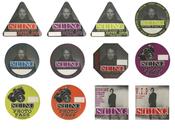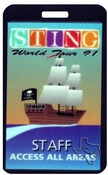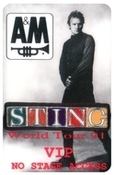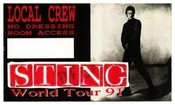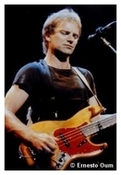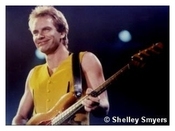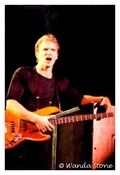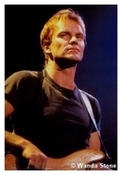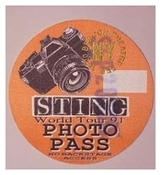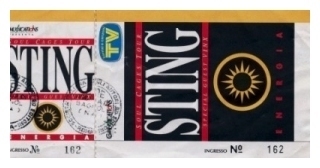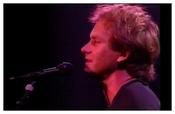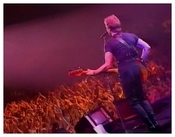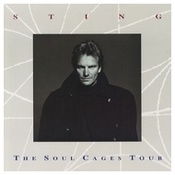
A rocker past...
Five thousand people turned out for Sting's Neapolitan show - A refined performance by the Newcastle professor who seems to have lost the grit of his Police days.
Five thousand people attended Sting's concert, and many left the new Palapartenope more than satisfied. Comment: The evening was truly remarkable; the musicians played with prestige, the former Police singer sang with professionalism, and the audience seemed to enjoy the show. So, what negative things can be said about such a performance?
Nothing, absolutely nothing. Except that one fundamental element was missing: that essential touch of emotion. And can this seemingly small sentiment quickly make a "great" concert slide into the rank of a simple opportunity to hear a beloved artist live? Of course it can, especially when there's a star on stage who has created all the conditions to tell people: don't come see me, because I perform music I've defined as "reactionary nothingness." A statement that, despite landing in the minds of fans like an unpleasant nightmare to be quickly erased, has caused some embarrassment. And yes, because whatever Matthew Gordon Summer (aka Sting) wants to call it, his music is and always will be rock. Including the myriad ethnic and Mediterranean nuances that characterized 'The Soul Cages,' his latest album.
And it's precisely with 'All This Time,' the most popular track from his recent LP, at 9:30 PM, that Sting opens the concert at the Palapartenope in Fuorigrotta. Almost like an actor playing himself, the Newcastle professor appears stiff.
It even seems like he's playing out of a kind of self-satisfaction. And then one longs for the days of the Police's energy. Today, Sting speaks of departing ships, stormy seas, wandering souls. Elegant phrases, refined music, undoubtedly. Yet it seems to lack a solid backbone.
But the audience is on board. They accept the sting's new direction almost out of dutiful respect. Sting plays his cards well, and after a confusing "Jeremiah Blues (Pt. 1)," he launches into the Italian "Muoio Per Te." The pronunciation is curious, but it's an effect that doesn't disturb. Indeed, if there were no doubt that the Italian version of "Mad About You" was recorded for marketing purposes, one might even feel proud of such a gift from the international Sting. The audience responds, and the show takes off.
The set is spare, as is the band, which consists of a small but efficient group: the excellent Vinnie Colaiuta lays down a crisp rhythm; the electric notes of a six-string are entrusted to the young Dominic Miller; David Sancious creates the carpet of harmonic sounds with his keyboards.
The English professor, however, doesn't forget his past with the Police, and he brings it back.
Also because it helps him keep the show's spirits high. And it's the now classic songs like 'Roxanne,' 'Walking on the Moon,' 'Message in a Bottle,' and 'Every Breath You Take' that really warm up the large audience. Perhaps the best moments of the evening. Like the final encore, 'Fragile,' given to the enthusiastic audience. The setlist is rounded out with 'Consider Me Gone,' a track from his first solo album, and almost all the songs from his latest LP.
Nearly two hours of music lead to a hypothesis: since rock is built on its own ruins, it's likely that in order to grow, it can't do without its detractors.
(c) Il Roma by Pasquale Elia (thanks to Valeria Vanella)
Sting, what a desire to play...
Sting still wants to play. He proved it last night in front of more than five thousand young people who responded to the call of his music. There was much anticipation for this concert; there were fears that the musician had become bourgeois, that he had forgotten his roots. Instead, Sting convinced almost everyone with a show that was completely focused on his past, and at times thrilling. Gordon Sumner, the singer's real name, has made peace with rock. His entire show is nothing less than a hymn to the music that has defined the last thirty years. It may seem banal, but the musician's greatness seems even clearer when he renounces his present.
The concert's setlist, in fact, eliminates most of the current songs to include the songs that made the bassist famous during his time with the Police. The concert begins with "All This Time" and continues with the Italian version of "Mad About You," "Muoio Per Te." It's the only concession Sting makes to his uncertain present. The desire, if not to change the rules, at least to amaze and not bore, remains intact. From this moment on, Sting overturns the show's setlist. The songs from 'The Soul Cages' are out. They are replaced by the Police's greatest hits: 'Roxanne,' 'Driven to Tears,' 'Walking on the Moon,' 'King of Pain.' This time, unlike his last tour, Sting has made a critical assessment. The new versions are halfway between the energy of his early days and his latest solo efforts.
Sting is back, but to do so, he's had to somehow deny himself. The concert is packed with references. Jimi Hendrix, the Spencer Davis Group, and Tim Hardin are the most obvious. Music from the '60s, the era in which rock flourished and became the language of the younger generations.
Sting has probably understood that you can't rewrite the music of tomorrow without taking into account that of yesterday. And although his current backing musicians often make us miss their former colleagues in the Police, the new formula works. Sting is convincing even without forcing it. At forty, he still sends messages. The most obvious is the Police's signature song, "Message in a Bottle." An S.O.S. that builds a bridge between the past and the future, still speaking to the generation that dreamed of changing the world. We don't know where Sting's music is headed, but it's certain that the artist is rediscovering himself. And with his pride as a musician, he still fulfils the hopes of young people around the world.
(c) Il Giornale di Napoli by Alfredo d'Agnese (thanks to Valeria Vanella)
Six thousand people at the Palapartenope for the Naples leg of the "Soul Cages" tour, which confirmed the vices and virtues of an artist in crisis...
From "All This Time" to "Message in a Bottle" and "Purple Haze," tributes to Hendrix and Gil Evans. The band is compact, but it doesn't hold a candle to the star's previous line-ups. Only the Police's old pop-reggae gems ignite the crowd.
"A Message in a Bottle," a kind of SOS: when Sting sets aside his own repertoire and attacks the Police's old hits, it's as if he's issuing an SOS, as if he's looking to the English trio's ancient reggae for that extra edge this "Soul Cages" tour lacks. And, more generally, to his new direction, to the career of a rock star who feels such a sense of responsibility that he's even questioning his own work - rock.
The blond rocker, tired of rock, is trapped in a gilded cage that seems to prevent him from flying: he's one of the most successful artists, one of the few stars of recent years. He's combined punk and reggae, infused his music with jazz and soul, worked in film and theatre, become politically engaged, and put his success at the service of noble causes, garnering significant publicity.
And now? 'Soul Cages,' the album, showed a man searching for himself, engaged in a sort of unlikely process of self-analysis. Six thousand people gathered last night to applaud him in the cauldron of the new Pala Partenope - the 'Soul Cages' show confirmed the impression I'd had while listening to the album. Compared to the first leg of the tour, Sting is now stepping on the gas, certain overly self-indulgent atmospheres seem to have disappeared, along with pointless autobiographical asides. All in favour of a cathartic rock energy. The live act attempts to rediscover the lost essentiality, and the four-piece line-up - the powerful David Sancious on keyboards, the metronomic Vinnie Colaiuta on drums, and an insecure Dominic Miller on guitar - facilitates the task, even if the audience is somewhat disappointed by the comparison with the Newcastle bassist's past super-bands.
The show's enjoyment, therefore, varies, from "All This Time" to "Mad About You" - "I Die For You" - from the Dylan-esque references of "When The World Is Running Down" to the closing "Fragile," from "Why I Should I Cry For You" to "I Miss You Kate," from "The Wild Wild Sea" to "When The Angels Fall," arguably the most significant track from the recent production: "High above the world, tonight the angels watch us sleep, and beneath a bridge of stars we dream safely." But perhaps the dream is dreaming of us, flying with the seagulls, perhaps the dream is dreaming of us, riding on the tails of eagles?
Sting tries to earn the title of poet and prophet earned by albums like 'The Dream of the Blue Turtles' and songs like 'They Dance Alone,' forgetting along the way that the true strength of his art is his ability to create irresistible pop songs, gems like 'Every Little Thing (She Does Is Magic),' 'Message in a Bottle,' 'Tea in the Sahara,' 'Walking on the Moon,' and 'Every Breath You Take,' which, at the PalaTenda, inflamed spirits and enthralled the audience.
The secret of pop masterpieces, of the Police's marvellous and light-hearted architectures for example, lies precisely in their apparent insubstantiality, in a declared simplicity that transforms them into fragments of the lives of those who listen, sing, and whistle them. And on this front, Sting has little to fear: his melodies are often irresistible, his rhythms sparkling, his ability to hold the An undeniable stage. As soon as he abandons the role of the Narcissus-like star, you can feel the fresh air of his early days, when, with his bandmates Andy Summers and Stewart Copeland, he reformed the world of rock with a touch of white reggae.
Times have changed, of course, and 'Message in a Bottle' reminds us once again: "A true castaway, an island lost in the sea, another day of loneliness, no one but me. More loneliness than a man can bear. Save me before I sink into despair, I'll send an SOS to the world, I hope someone gets my... message in a bottle," Sting sang once again last night. The song ends with a message of hope: "I woke up this morning and I couldn't believe what I saw: millions of bottles on the beach." And today, Sting, the struggling superstar, perhaps no longer believes in that hope. But when he lets go, he relaxes and finally enjoys the sensuality of his craft. Things change, the "Soul Cages" tour takes on a new surge, all problems are put aside, and, once again, ...it's only rock and roll, but we like it. And all the discussions about the nature of rock - is it left-wing? Is it reactionary? - become pointless. This also happens when listening to the strains of "Purple Haze," a tribute to Jimi Hendrix's guitar playing but also, and perhaps above all, to one of Sting's acknowledged masters, Gil Evans, who was a huge fan of the Seattle genius, creating jazz arrangements of his songs that still shine with absolute brilliance today.
The never-ending "Soul Cages" tour is now coming to an end. Sting will have time to rest, to think about new projects, to rediscover himself. And perhaps also the ineffable magic that makes rock and roll great.
(c) Il Mattino by Federico Vacalebre (thanks to Valeria Vanella)

